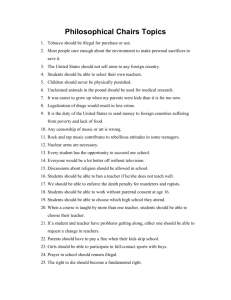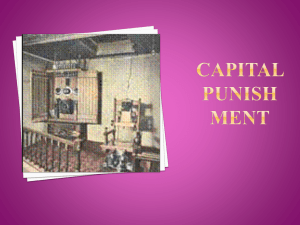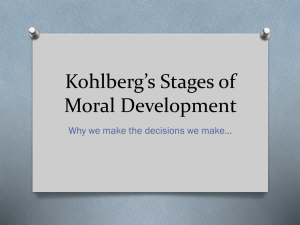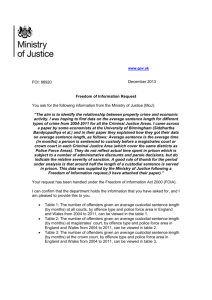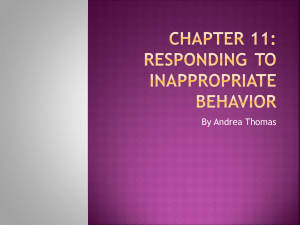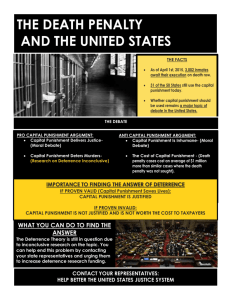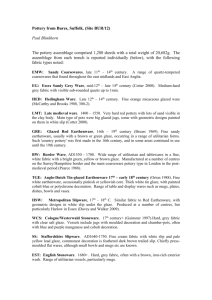Key words - Studyhistory
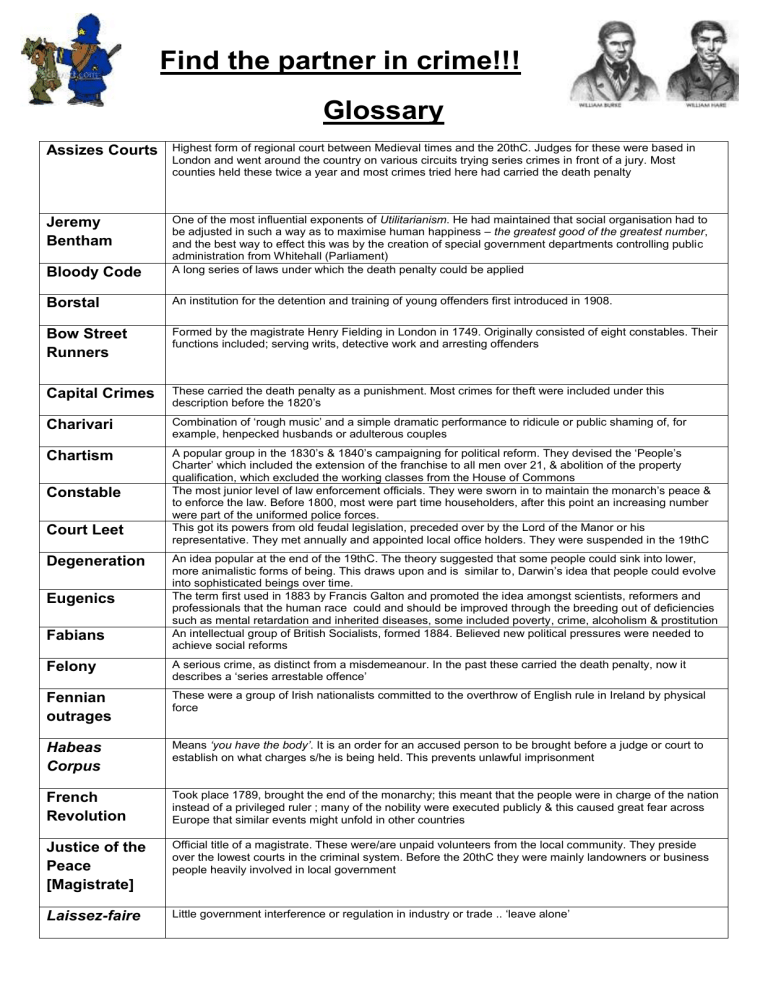
B
Find the partner in crime!!!
Glossary
Assizes Courts
Highest form of regional court between Medieval times and the 20thC. Judges for these were based in
London and went around the country on various circuits trying series crimes in front of a jury. Most counties held these twice a year and most crimes tried here had carried the death penalty
Jeremy
Bentham
One of the most influential exponents of Utilitarianism . He had maintained that social organisation had to be adjusted in such a way as to maximise human happiness – the greatest good of the greatest number , and the best way to effect this was by the creation of special government departments controlling public administration from Whitehall (Parliament)
Bloody Code
A long series of laws under which the death penalty could be applied
Borstal
An institution for the detention and training of young offenders first introduced in 1908.
Bow Street
Runners
Formed by the magistrate Henry Fielding in London in 1749. Originally consisted of eight constables. Their functions included; serving writs, detective work and arresting offenders
Capital Crimes
These carried the death penalty as a punishment. Most crimes for theft were included under this description before the 1820’s
Charivari
Chartism
Constable
Court Leet
Combination of ‘rough music’ and a simple dramatic performance to ridicule or public shaming of, for example, henpecked husbands or adulterous couples
A popular group in the
1830’s & 1840’s campaigning for political reform. They devised the ‘People’s
Charter’ which included the extension of the franchise to all men over 21, & abolition of the property qualification, which excluded the working classes from the House of Commons
The most junior level of law enforcement officials. They were sworn in to maintain the monarch’s peace & to enforce the law. Before 1800, most were part time householders, after this point an increasing number were part of the uniformed police forces.
This got its powers from old feudal legislation, preceded over by the Lord of the Manor or his representative. They met annually and appointed local office holders. They were suspended in the 19thC
Degeneration
An idea popular at the end of the 19thC. The theory suggested that some people could sink into lower, more animalistic forms of being. This draws upon and is similar to, Darwin’s idea that people could evolve into sophisticated beings over time.
Eugenics
The term first used in 1883 by Francis Galton and promoted the idea amongst scientists, reformers and professionals that the human race could and should be improved through the breeding out of deficiencies such as mental retardation and inherited diseases, some included poverty, crime, alcoholism & prostitution
Fabians
An intellectual group of British Socialists, formed 1884. Believed new political pressures were needed to achieve social reforms
Felony
Fennian outrages
A serious crime, as distinct from a misdemeanour. In the past these carried the death penalty, now it describes a ‘series arrestable offence’
These were a group of Irish nationalists committed to the overthrow of English rule in Ireland by physical force
Habeas
Corpus
Means
‘you have the body’
. It is an order for an accused person to be brought before a judge or court to establish on what charges s/he is being held. This prevents unlawful imprisonment
French
Revolution
Justice of the
Peace
[Magistrate]
Took place 1789, brought the end of the monarchy; this meant that the people were in charge of the nation instead of a privileged ruler ; many of the nobility were executed publicly & this caused great fear across
Europe that similar events might unfold in other countries
Official title of a magistrate. These were/are unpaid volunteers from the local community. They preside over the lowest courts in the criminal system. Before the 20thC they were mainly landowners or business people heavily involved in local government
Laissez-faire
Little government interference or regulation in industry or trade .. ‘leave alone’
Luddite disturbances
[Luddism]
These took place in the counties of Nottinghamshire, Cheshire, Derbyshire, Leicestershire and Yorkshire during 1811-13. Led by a fictional character, they attacked new machinery and mills attempting to protect their work practices, skilled cloth making by hand in the textile industry & wages
Misdemeanour
Usually tried in a magistrates’ court now it describes a ‘non- arrestable offence’
Petty sessions
A court operated between one and three judges of the peace. Can sit weekly or daily. These were formalised in the 19thC. Felonies could not be tried here. Now usually known as magistrates courts
Police Courts
Handled cases brought in by the police, these were staffed by stipendiary (salaried) magistrates. They dealt with a wide range of minor offences; drunk & disorderly, vagrancy, petty theft etc yet the WC could
Quarter
seek justice
A court sitting four to six times a year, often moving around the country. They tried offences and dispensed punishments without a jury
sessions
Residuum
Parole
Special
Constables
[Specials]
A late 19thC term for the poorest, roughest and most unproductive element, (groups) of the working class,
[similar to Marx’s lumpenproletariat] Some believed this group could be reclaimed, others believed their situation was hopeless
Early release of a prisoner who is then subject to continued monitoring as well as compliance with certain terms and conditions for a specified period
Volunteers from the public sworn into the police force for a limited period to assist with special duties. They could be armed and were often used to maintain public order during periods of popular disturbances
Ticket of leave system
An early form of probation, introduced by the Penal Servitude Act of 1853. Issued to convicts on release licensing them to free movement but only within set terms
Vagrancy
[vagrants]
Warrant
Word used for the wandering about of homeless people. Many Acts since the 15thC specified this as a criminal offence
A legal document issued by a court, or by a magistrate or judge which allows an action which would otherwise be outside of the law
An urban force, initially of householders, but later, badly paid employees, whose job was to keep an eye on the streets at night and stop suspicious persons and enforce curfews
Watch/night watch
‘benefit of clergy’
‘neck verse’
A claim that you have a right to go on trial in a Church Court
The passage from the Bible that people had to read to claim ‘benefit of clergy’
Less eligibility
The idea that living & working conditions in the workhouse had to be worse than the worst possible living
& working condition outside the workhouse. This principle existed to deter people from claiming poor relief
Scavenger
Described someone who cleaned the streets by removing refuse,
A type of prison where convicted prisoners were sent
House of
Correction
Moral
Crisis/panics
The
Panopticon
Occurs when a condition, episode, person or group of persons emerges to become defined as a threat to societal values and interests
Hard Labour
An additional form of punishment beyond imprisonment alone and included tasks like walking the treadmill or turning the crank
Silent system
A type of prison punishment in the 19thC where prisoners were kept in complete silence
A type of institutional building designed by Jeremy Bentham in the late eighteenth century. to allow an observer to observe all inmates of an institution without them being able to tell whether or not they are being watched.
Separate system
A type of prison punishment in 19thC where prisoners were kept completely separate from each other
The Treadmill
Used in prisons as a form of hard labour in the 19thC Prisoner simply walked the wheel at first to provided flour to make money for the gaol, from which the prisoners earned enough to pay for their keep. Later in
The Crank
the 19thC there was no end product and the treadmill was walked just for punishment
Another equally pointless device was the Crank. A large handle, in the cell, that a prisoner would have to turn, thousands of times a day. This could be tightened by the warders, making it harder to turn, which resulted in their nickname of 'screws'. These punishments were abolished in 1898
Corporal punishment
A form of physical punishment that involves the deliberate infliction of pain as retribution for an offence, or for the purpose of disciplining or reforming a wrongdoer, or to deter attitudes or behaviour deemed unacceptable.
Birching
Howard
Reform
League
A form of corporal punishment with a birch rod, typically applied to the recipient's bare buttocks, although occasionally to the back and/or shoulders.
The oldest penal reform organisation in the world. Founded in 1866 & merged with the Penal Reform
League in 1921. It has had a significant impact on the development of criminal justice policy.
Police Gazette
Magazine produced in London from 1772 onwards, for circulation among all the police forces of Britain. Its primary purpose was to publish notices of wanted criminals with requests for information, and where
The ‘Penny
Dreadfuls’
appropriate to offer rewards. A kind of early precursor of an Intranet.
A type of British fiction publication in the 19th century that usually featured lurid serial stories appearing in parts over a number of weeks, each part costing an (old) penny. Publications featured cheap sensational fiction & were aimed primarily at working class adolescents
Probation
Remand
Hulks
A system where offenders are allowed their freedom on condition of good behaviour. If they break the rule they can be imprisoned
A prisoner may be on bail , i.e., mostly free provided specified conditions are met. For more serious offences, or if the accused is believed to pose a high risk of absconding "jumping bail") or harming the public, this will be in custody usually a jail or prison until trial.
Ships used as prisons in 19thC Britain
A wooden frame from which the hanging noose is attached
Gallows
Pillory
Mudlark
Commuted
A wooden frame with holes for the head and hands of the convicted offender. They would be publicly humiliated and ridiculed
Someone who scavenges in river mud for items of value, especially in London during the late 18th and
19th centuries
A punishment being made less severe
Poaching
Illegally hunting animals, birds or fish on someone else’s property
Deserving poor rookery
Refers to people in the 19thC who could not look after themselves or go to work. They included the ill, the infirm, the elderly, and children with no-one to properly care for them & those who were unable to find work
– either due to cyclical or long term unemployment in the area, or a lack of skills
A term given in the 18th and 19th centuries to a city slum occupied by poor people and frequently also by criminals and prostitutes. Such areas were overcrowded, with low-quality housing and little or no sanitation.
A method of killing someone

